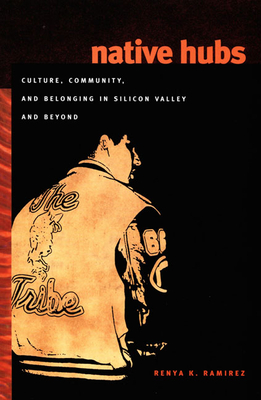Native Hubs: Culture, Community, and Belonging in Silicon Valley and Beyond

Native Hubs: Culture, Community, and Belonging in Silicon Valley and Beyond
Most Native Americans in the United States live in cities, where many find themselves caught in a bind, neither afforded the full rights granted U.S. citizens nor allowed full access to the tribal programs and resources--particularly health care services--provided to Native Americans living on reservations. A scholar and a member of the Winnebago Tribe of Nebraska, Renya K. Ramirez investigates how urban Native Americans negotiate what she argues is, in effect, a transnational existence. Through an ethnographic account of the Native American community in California's Silicon Valley and beyond, Ramirez explores the ways that urban Indians have pressed their tribes, local institutions, and the federal government to expand conventional notions of citizenship.
Ramirez's ethnography revolves around the Paiute American activist Laverne Roberts's notion of the "hub," a space that allows for the creation of a sense of belonging away from a geographic center. Ramirez describes "hub-making" activities in Silicon Valley, including sweat lodge ceremonies, powwows, and American Indian Alliance meetings, gatherings at which urban Indians reinforce bonds of social belonging and forge intertribal alliances. She examines the struggle of the Muwekma Ohlone, a tribe aboriginal to the San Francisco Bay area, to maintain a sense of community without a land base and to be recognized as a tribe by the federal government. She considers the crucial role of Native women within urban indigenous communities; a 2004 meeting in which Native Americans from Mexico and the United States discussed cross-border indigenous rights activism; and the ways that young Native Americans in Silicon Valley experience race and ethnicity, especially in relation to the area's large Chicano community. A unique and important exploration of diaspora, transnationalism, identity, belonging, and community, Native Hubs is intended for scholars and activists alike.
PRP: 325.04 Lei
Acesta este Prețul Recomandat de Producător. Prețul de vânzare al produsului este afișat mai jos.
260.03Lei
260.03Lei
325.04 LeiLivrare in 2-4 saptamani
Descrierea produsului
Most Native Americans in the United States live in cities, where many find themselves caught in a bind, neither afforded the full rights granted U.S. citizens nor allowed full access to the tribal programs and resources--particularly health care services--provided to Native Americans living on reservations. A scholar and a member of the Winnebago Tribe of Nebraska, Renya K. Ramirez investigates how urban Native Americans negotiate what she argues is, in effect, a transnational existence. Through an ethnographic account of the Native American community in California's Silicon Valley and beyond, Ramirez explores the ways that urban Indians have pressed their tribes, local institutions, and the federal government to expand conventional notions of citizenship.
Ramirez's ethnography revolves around the Paiute American activist Laverne Roberts's notion of the "hub," a space that allows for the creation of a sense of belonging away from a geographic center. Ramirez describes "hub-making" activities in Silicon Valley, including sweat lodge ceremonies, powwows, and American Indian Alliance meetings, gatherings at which urban Indians reinforce bonds of social belonging and forge intertribal alliances. She examines the struggle of the Muwekma Ohlone, a tribe aboriginal to the San Francisco Bay area, to maintain a sense of community without a land base and to be recognized as a tribe by the federal government. She considers the crucial role of Native women within urban indigenous communities; a 2004 meeting in which Native Americans from Mexico and the United States discussed cross-border indigenous rights activism; and the ways that young Native Americans in Silicon Valley experience race and ethnicity, especially in relation to the area's large Chicano community. A unique and important exploration of diaspora, transnationalism, identity, belonging, and community, Native Hubs is intended for scholars and activists alike.
Detaliile produsului









